

Het rariteitenkabinet vult zich verder. Foto: Sh4rp_i (cc, via Flickr) Vorige week vrijdag kondigde het kabinet aan dat studenten die twee studies tegelijkertijd volgen niet langer het instellingscollegegeld verschuldigd zijn.
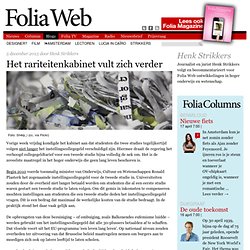
Hiermee draait de regering het verhoogd collegegeldtarief voor een tweede studie bijna volledig de nek om. Het is de zoveelste maatregel in het hoger onderwijs die geen lang leven beschoren is. Begin 2010 voerde toenmalig minister van Onderwijs, Cultuur en Wetenschappen Ronald Plasterk het zogenaamde instellingscollegegeld voor de tweede studie in. How the Great War laid waste to liberal education. The reaction against liberal education acquired its most systematic form in America.
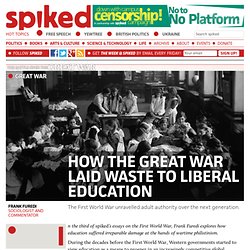
Even before the outbreak of the war, schools faced a barrage of criticism for their failure to introduce business values and the ‘science of efficiency’ into the classroom. During the war, the call for ‘educational efficiency’ was coupled with demands to redefine the purpose of schooling. Influential politicians, business leaders and educators argued that schools had to socialise children into the American way of life, and prepare them for the world of work. In 1918, this anti-academic turn was confirmed in a report titled ‘Cardinal Principles of Secondary Education’, published by the Commission on the Reorganization of Secondary Education. ScienceGuide. 9 oktober 2013 - De VU is een samenwerkingsverband gestart met 32 basisscholen.
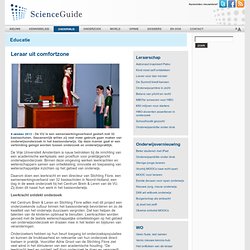
Gezamenlijk willen zij veel meer gebruik gaan maken van onderwijsonderzoek in het basisonderwijs. Why The Sopranos may not be the best business model for universities. Did The Sopranos fall into decline by failing to change with the times?
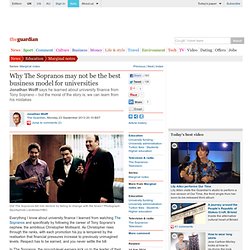
Photograph: Sportsphoto Ltd/Allstar/HBO Everything I know about university finance I learned from watching The Sopranos and specifically by following the career of Tony Soprano's nephew, the ambitious Christopher Moltisanti. As Christopher rises through the ranks, with each promotion his joy is tempered by the realisation that financial pressures increase to previously unimagined levels. Debunking The Narrative Of Silicon Valley's Innovation Might. On memory, profitability, disruption and socialised alternatives.
On memory: In scoping the policy space inside which Australian Higher Education is being restructured, Kate Bowles argues for recognising the complexity of higher education in all its forms, and for finding spaces to contest the neoliberal mantra of efficiency.
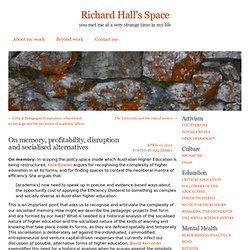
She argues that: [academics] now need to speak up in precise and evidence-based ways about the opportunity cost of applying the Efficiency Dividend to something as complex and socially diverse as Australian higher education.
Academic disciplines as brands. Students as brands. How Academia Resembles a Drug Gang. In 2000, economist Steven Levitt and sociologist Sudhir Venkatesh published an article in the Quarterly Journal of Economics about the internal wage structure of a Chicago drug gang.
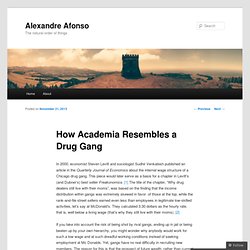
This piece would later serve as a basis for a chapter in Levitt’s (and Dubner’s) best seller Freakonomics. [1] The title of the chapter, “Why drug dealers still live with their moms”, was based on the finding that the income distribution within gangs was extremely skewed in favor of those at the top, while the rank-and-file street sellers earned even less than employees in legitimate low-skilled activities, let’s say at McDonald’s. They calculated 3.30 dollars as the hourly rate, that is, well below a living wage (that’s why they still live with their moms). [2] With a constant supply of new low-level drug sellers entering the market and ready to be exploited, drug lords can become increasingly rich without needing to distribute their wealth towards the bottom. Academia as a Dual Labour Market.
The relentless school disaster movie is win-win for Michael Gove. Illustration by Matt Kenyon I nurse a deep respect for the person who says the incredibly unpopular thing at a public meeting, even while I'm hissing at them (that's an overstatement – I would never hiss).
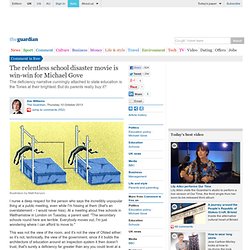
At a meeting about free schools in Walthamstow in London on Tuesday, a parent said: "The secondary schools round here are terrible. Everybody moves out, I'm just wondering where I can afford to move to. "
Football analogies « Critical Education. Nick Petford, vice-chancellor and CEO of the University of Northampton, has published a piece on the Guardian’s HE Profession Network making a comparison between higher education and the world of professional football.
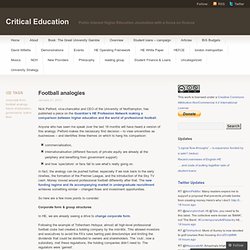
Anyone who has seen me speak over the last 18 months will have heard a version of this analogy. Petford makes the necessary first decision – to view universities as businesses – and identifies three themes on which to hang his comparison: commercialisation,internationalisation (different flavours of private equity are already at the periphery and benefiting from government support)and how ‘spectators’ or fans fail to see what’s really going on.
In fact, the analogy can be pushed further, especially if we look back to the early nineties, the formation of the Premier League, and the introduction of the Sky TV cash. Money moved around professional football differently after that. So here are a few more points to consider: Corporate form & group structures. A teacher evaluation session out of ‘Star Wars’ Think “Star Wars.”
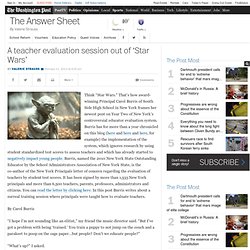
That’s how award-winning Principal Carol Burris of South Side High School in New York frames her newest post on Year Two of New York’s controversial educator evaluation system. Burris has for more than a year chronicled on this blog (here and here and here, for example) the implementation of the system, which ignores research by using student standardized test scores to assess teachers and which has already started to negatively impact young people.
Burris, named the 2010 New York State Outstanding Educator by the School Administrators Association of New York State, is the co-author of the New York Principals letter of concern regarding the evaluation of teachers by student test scores. It has been signed by more than 1,535 New York principals and more than 6,500 teachers, parents, professors, administrators and citizens. Strikkers: Onzorgvuldig. Strikkers: Oxbridge aan de Noordzee. Ik heb een hekel aan vergelijkingen tussen de universiteit en de industrie.
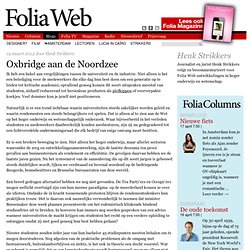
Niet alleen is het een belediging voor de medewerkers die elke dag hun best doen om een generatie op te leiden tot kritische academici, opvallend genoeg komen dit soort uitspraken meestal van studenten, zichzelf reducerend tot hersenloze producten als plofkippen of voorverpakte koekjes. Veel dommer kun je jezelf niet positioneren. Natuurlijk is er een trend zichtbaar waarin universiteiten steeds zakelijker worden geleid en waarin rendementen een steeds belangrijkere rol spelen.
Dat is alleen al te zien aan de Wet op het hoger onderwijs en wetenschappelijk onderzoek. Waar bijvoorbeeld in het verleden studenten en medewerkers daadwerkelijk konden meebesturen, zijn zij nu gedegradeerd tot een lichtveredelde ondernemingsraad die elk bedrijf van enige omvang moet bezitten. Superheroes in de politiek. Onderzoek22 februari 2013 12:04 |Wanneer de Duitse krant Der Spiegel in 2002 president George W.
Bush op de cover afbeeldt als superheld, verwachten zij een verontwaardigde reactie van het Witte Huis. Daarentegen bestelt Bush 33 posters van de afbeelding. De link tussen politiek en superhelden is niet direct gelegd. Cliëntelisme en consumentisme. En seks. Door Geerten Waling. In Search of a Metaphor for “Reform” Diane Ravitch. Over recent years, I have heard many metaphors used to explain what is happening–what is being done to–the nation’s public schools. In New York City, parents often use the phrase “the emperor has no clothes.”